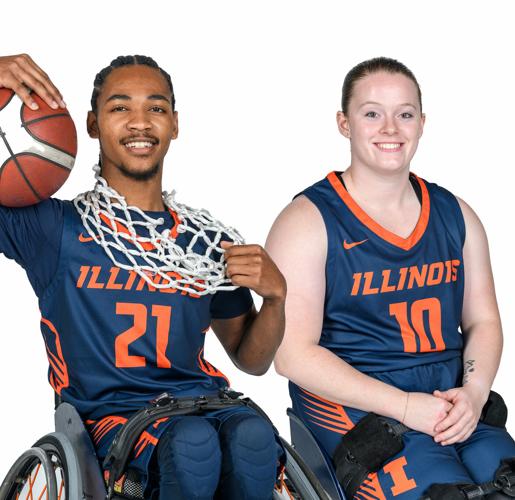
Martrell Stevens and Mary Wagstaff will compete this week for the University of Illinois in the men’s and women’s 47th annual National Intercollegiate Wheelchair Basketball Tournament.
Martrell Stevens was 4 years old on that May day in 2008 when he and his family were leaving his grandmother’s house in inner city Chicago.
His cousin was carrying him when, standing across the street, a man with a gun began shooting at Stevens’ grandmother’s house, having been told falsely that that was where an enemy of the shooter lived.
Stevens was hit in the spine and underwent three months of rehabilitation at the Illinois Rehabilitation Institute of Chicago.
Life was difficult for the youngster, but he didn’t let it defeat him.
Stevens experienced another life-altering moment when a coach from the Chicago Park District who operated a wheelchair basketball program showed up with “a ball chair" — a wheelchair.
It was love at first sight.
“I was going super fast in the hallways and falling in love with the chair itself,” Stevens said.
Now a member of the University of Illinois men’s wheelchair basketball team, Stevens’ positive outlook belies his physical condition.
“I never stopped playing from that moment forward,” he said of his introduction to the game. “I appreciated being able to meet people with disabilities like me.”
Stevens and his teammates will host the 47th annual National Intercollegiate Wheelchair Basketball Tournament Wednesday through Saturday at State Farm Center. Eleven men’s teams and six women’s teams will compete. Players of various physical abilities will be on the floor.
The wheelchair basketball game uses a classification rating system from 1.0 to 4.5, with a 1.0 being someone with a greater disability. A team may not have five players on the court with a combined rating higher than 14 points.
“It’s a classification to make it fairer because people have different ability levels,” said Stevens, a senior majoring in recreation and tourism, who is rated a 1.0.
“I didn’t have a lot of hip function, and I’m a little bit floppy (in the chair) when I get my momentum going,” Stevens said.
The team also has amputees and people with disabilities such as cerebral palsy and spina bifada.
***
Mary Wagstaff, a member of the women’s team, has a rating of 4.5. She has a hip disability and is able to walk but not run.
A first-year grad student majoring in recreation sport and tourism, this is her fourth year at Illinois after one year at Parkland College.
Wagstaff’s love of the sport stems mainly from her competitive nature. Off the court, she enjoys hanging out with teammates.
“Our program, the men’s and women’s teams, are close,” Wagstaff said. “We practice at the same time at The ARC” (Activities and Recreation Center).
“We hang out at The Quad sometimes and at some team dinners. If we’re not hanging out as a team, a couple of us will get coffee together and that type of stuff.”
The rules are much the same as regular basketball, Wagstaff said, except for dribbling the ball.
A player is allowed to wheel the chair and bounce the ball at the same time, but if the ball is picked up or put on the player’s lap, they can only push twice before having to shoot, pass or dribble the ball game.
There’s no dribbling in wheelchair basketball.
***
Life was different for Stevens growing up. He said experiencing his disability at such a young age helped because he didn’t know much about life before that.
“It was difficult not to be able to play on the playground or play the same sports,” Stevens said. “I think basketball gave me that sense of play or sense of belonging.”
Stevens received a scholarship Neilsen Scholarship Program, which provides grants for students with A spinal cord injury and funds to maintain opportunities.
His strong attributes on the court, he said, are being a good court general — “the typical point-guard role.”
“Most 1.0s don’t do the same things that I do. I’m more of a ball-dominant passer point guard. Most 1.0 players are more screeners.”
In wheelchair basketball, he said, the point guard is generally in the middle of the action, not up top.
Stevens’ post-college goal is to make the Paralympics.
“There’s professional leagues outside of the United States. If I get enough looks playing in the Paralympics” he might get a shot in a pro league.
If that isn’t in the cards, he’d like to be involved with an NBA team. Stevens served an internship with The Indianapolis Pacers and The Fever last year.
“That was Caitlin Clark’s first year, and I got to watch her” on The Fever.
Stevens was involved in community engagement in a revolving internship role.
“We’d go all over Indiana and coach over 125 or 130 kids throughout the day,” he said. “I was a coach and ran my own station.
“It was pretty cool to see how my skills transferred to able-bodied kids.”
Stevens said the youngsters indicated he was their favorite coach.
***
Wagstaff said shooting is probably her strong suit.
“The higher classification (players) are well versed in everything,” she said. “We have more function, so it’s easier for us to do those kind of things. Our higher-classificaiton players are the better ballhandlers.”
Wagstaff said at times fouls can get “pretty bad.”
“I’ve flipped over a lot,” she said. “Sometimes that’s just me being stupid.”
Originally from Woods Cross, Utah, Wagstaff isn’t sure what she’d like to do after college.
“There’s professional leagues overseas. Also our U.S. national team. There’s a bunch of club teams around.”
As for a vocation, she’s undecided.
“I think it would be cool to work in like a national park,” Wagstaff said.
The Illini women, who are seeded third, open the tournament against sixth-seeded City University of New York at 10 a.m. Friday. The winner takes on second-seeded University of Texas-Arlington at 6 p.m. Friday. The national championship game will be played at 4 p.m. Saturday. Alabama drew the No. 1 seed.
The sixth-seeded men open against 11th-seeded Eastern Washington at 6 p.m. Wednesday. The winner plays third-seeded Alabama at 2 p.m. Thursday. The national championship game will be played at 2 p.m. Saturday. Arizona drew the No. 1 seed.

PUTNAM
FFA recognized PBL's Putnam
Paxton-Buckley-Loda High School FFA chapter member Karley Putnam was selected as the District 4 FFA proficiency winner in agriculture education.
A committee of agriculture industry representatives and teachers knowledgeable in this work-based area selected Putnam as the District 4 winner.
She is a daughter of Craig and Pam Putnam of Loda.
Brodee McCormick, Mike White and Kirsten Wyatt are the agriculture teachers and FFA advisors at Paxton-Buckley-Loda.
Putnam was previously chosen as the chapter and section awardee is this area.
Other PBL FFA chapter and section winners who competed in the District 4 Proficiency Awards on March 6 include Ally Wright, Ag Sales Placement; Payton Dorche, Food Service Placement; Mason Loschen, Forage Production; Kyleigh Williams, Equine Entrepreneurship; Taylor Cole, Beef Production Placement; Rowan Caposieno, Safety; Alex Potter, Turf Grass Management; Kynzie Rust, Diversified Livestock; and Maddi DeOrnellas, Swine Entrepreneurship.

BOUSE RETIRES FROM RANTOUL PD Deputy Police Chief Justin Bouse retired after 25 years with the Rantoul Police Department. According to a department announcement, Bouse served in a variety of roles during his tenure, including detective, field-training officer and patrol sergeant. He also initiated progressive programming within the department.
Bouse celebrates retirement
Deputy Police Chief Justin Bouse retired after 25 years with the Rantoul Police Department.
According to a department announcement, Bouse served in a variety of roles during his tenure, including detective, field-training officer and patrol sergeant. He also initiated progressive programming within the department.

Rodney and Kaylee Larkin

Rodney and Kaylee Larkin and their 6-year-old daughter, Charlee.
Cancer benefit set in Fisher
A benefit for the family of Rodney Larkin is scheduled from 3 to 8 p.m. Saturday, April 5, at the Fisher Community Building.
Larkin was diagnosed with stage 4 squamous cell carcinoma of the mouth and neck and has been undergoing extensive treatment, including radical surgery, part of which involved removing six teeth and 37 lymph nodes, radiation and chemotherapy.
Larkin and his wife, Kaylee, are the parents of 6-year-old Charlee.
The cancer benefit will include an open donation dinner catered by Little Roch’s of Royal from 4 to 6 p.m., music and dancing, a dessert auction, silent auction, 50/50 raffle and bourbon basket raffle.
All winners of the silent auction and raffles will be announced at 7:30 p.m.
All proceeds will go to the family to help with their expenses.
An account has been set up at First Mid Bank, Rantoul.
Rodney Larkin’s parents, David and Diana Larkin, reside in Potomac. Kaylee Larkin’s parents, Dale and Debbie Sleigh, are Fisher residents.

Danville Noon Rotary presented checks to several area non-profits that benefit military veterans.
Danville Rotary supports veterans
Danville Noon Rotary Club presented $5,000 in donations to several local non-profits supporting veterans from funds raised through the 2024 Rotary Memorial Way Project.
Awards included a check for the Sparky Songer Scholarship, which was presented to Executive Director Tonya Hill of the DACC Foundation.
Larry Weatherford accepted a check on behalf of the Vermilion County War Museum.
Commander Bob Balla and Senior Vice Commander Dan Mullins received a check for the American Legion Post 210.
Jolene Watson and Aaron Cain received a check in support of the VA Illiana Health Care System Homeless Program.













